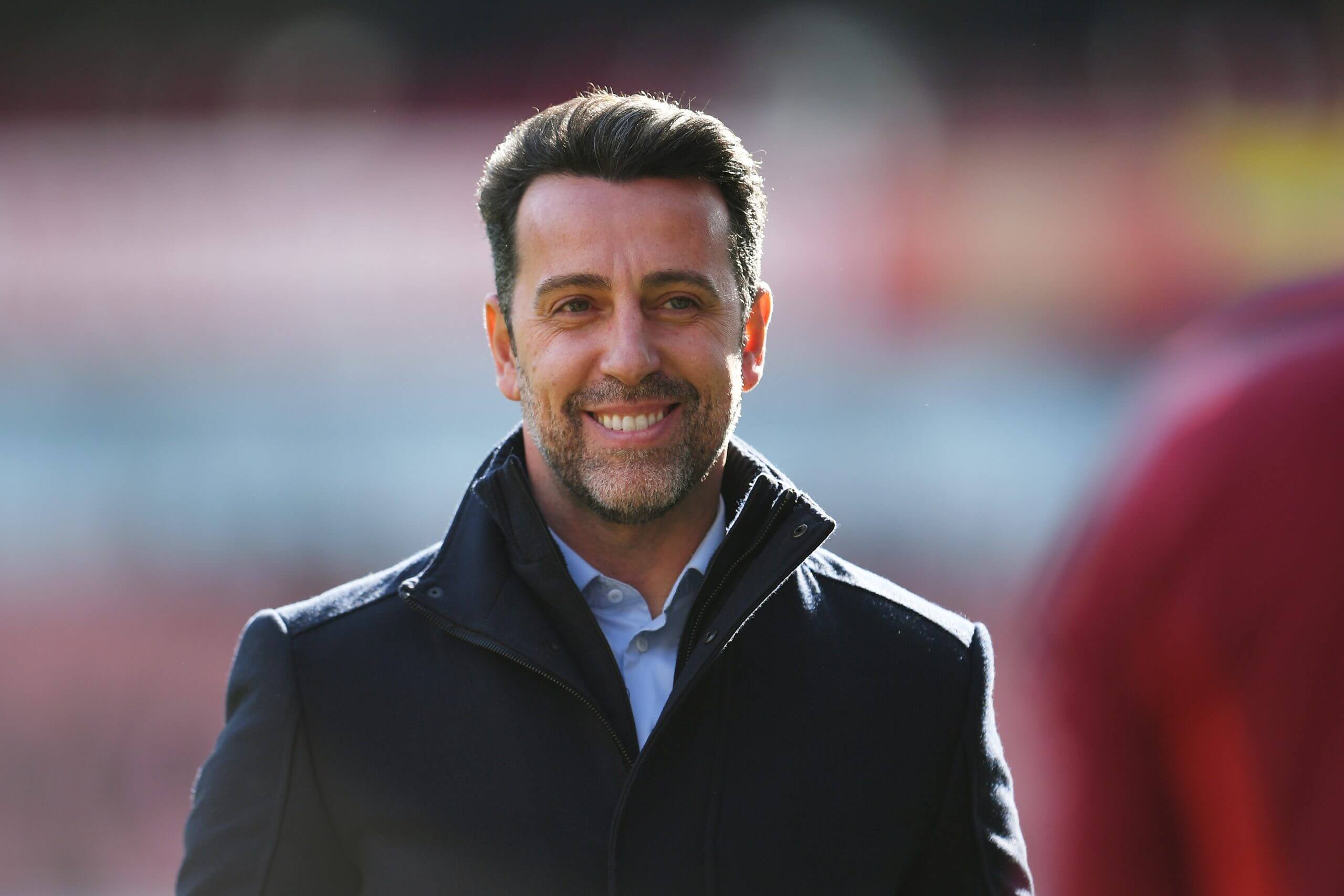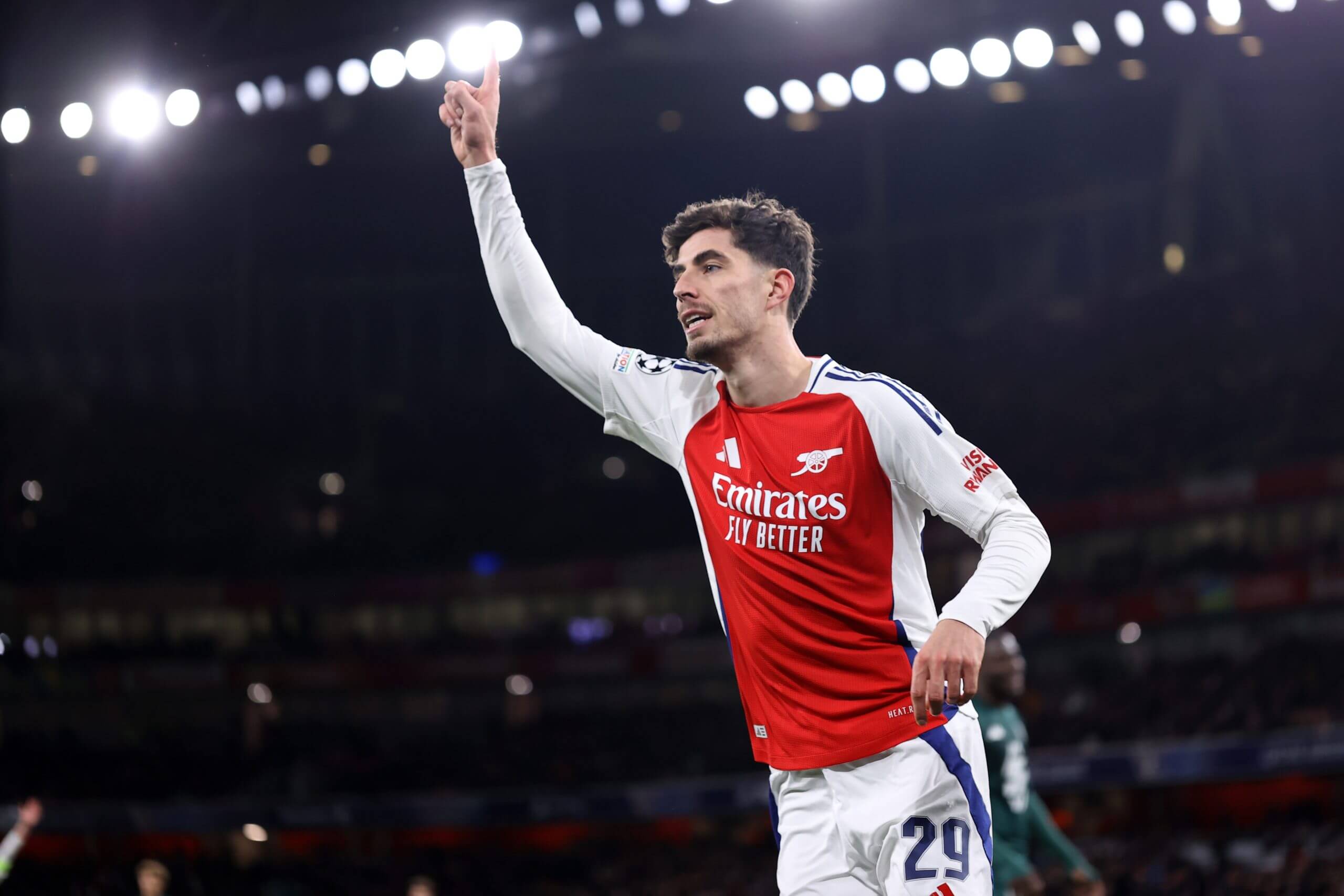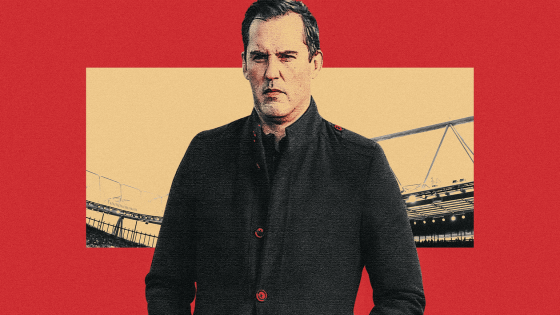After working in such close proximity for several years, Edu eventually told his deputy Jason Ayto that it was time to get out of Arsenal’s London Colney headquarters.
Ayto was typically one of the first to arrive at the training ground, and one of the last to leave. But Edu wanted him to experience a change of scene.
“At one stage, I said: ‘Jason, get out of the office please!’,” Arsenal’s former sporting director tells The Athletic. “It was for his development. I told him: ‘Get out there, meet people, call people, build relationships.’”
For Edu, it was the next step in the process of preparing Ayto — and Arsenal — for life without him.
“I felt since I arrived like I had to prepare someone for if I left one day,” Edu says. “I think it’s fair for the club — I did the same at Corinthians, and with Brazil. Someone has to understand all the information, to know everything internally and externally, and I felt Jason would be the one. And I said that to everyone internally.”
Edu’s preparation is paying off. Since the Brazilian’s resignation in November, 39-year-old Ayto has stepped into the breach as Arsenal’s interim sporting director. While Arsenal still intend to carry out a far-reaching recruitment process, Ayto is likely to remain in the post until at least the summer — and is considered by many as a strong candidate to land the role permanently.
That marks a remarkable rise for a man who, until recently, was not well known outside of Arsenal’s training ground. He certainly lacks the profile of former Invincible and Brazil international Edu — but many who have worked with him believe he has the required competence.
“Listen, people need an opportunity,” says Edu. “Remember when I arrived here, people said I didn’t have European experience. The club gave me the opportunity, and I showed I could do it. I strongly think I prepared someone else to do that — but people need the chance.”
Although many Arsenal fans only became familiar with Ayto recently, he has been with the club for a decade. His career began in recruitment and technical roles with Norwich City and the U.S. development team Chicago Inferno.
The trajectory of Ayto’s career changed when Edu joined Arsenal, initially as technical director, in 2019.
“His history with me was amazing,” recalls Edu. “I remember when I arrived he worked for the scouting department. When I came in, I tried to talk to people — interview them, see how they’re feeling, how they feel about the future, what they want to do in the club, all these things.

“And when I started to talk to Jason, I felt: ‘Wow, there is something special with this guy’. The way he behaves, the way he talks, the way he wants to help the club, the way he wants to progress in his career.
“Everything I asked the guy — helping me with contacts, presentations, research — he had the skills to do it. He knows a lot of people in football. He is really, really smart, able to find solutions.”
A fluent Portuguese speaker — his wife is Brazilian — Ayto and Edu quickly built a good rapport.
Edu identified a tension, however, between analysts like Ayto and the conventional scouting department led by Francis Cagigao and Peter Clark.
Arsenal had been seeking to modernise the recruitment team built during Arsene Wenger’s reign for some time — Ivan Gazidis had overseen the purchase of analytics company StatDNA in 2012. Part of Edu’s remit was to move towards a leaner, more agile model: a smaller team working in a collaborative, more holistic fashion.
It would save Arsenal money, too. When the global pandemic bit in 2020, they made the vast majority of their scouting team redundant. It was a painful process, one that meant unceremonious exits for distinguished staff like Clark, Cagigao and Brian McDermott.
Ayto was one of the few who were spared. Many of those who were let go considered him culpable. But Edu is prepared to take responsibility. “When I joined, I realised there was something to fix in this department,” he explains.
Ayto was undoubtedly one of the beneficiaries of the change. “I started to give Jason more responsibility in the scouting area,” says Edu. “He started to be closer to me. And everything I asked him to do, he always gave me the right answers, at the right time. He was really dedicated to show me more. The more responsibility I gave him, the more he delivered.
“I granted Jason the responsibility to help build a new structure and a new recruitment team. He started to interview people, make recommendations, give advice. We built the team together, Jason almost leading the whole process — I just took the final decisions.”
The initial team was comprised of Ayto, data specialist Tolly Coburn, analyst Mark Curtis and loan manager Ben Knapper — and was dubbed the Football Intelligence department. Later, James Ellis was added from Fulham to lead UK scouting. None of these were necessarily big names, but that was not Edu’s focus.
“Edu’s way of formulating teams is skill set and people over experience and profile,” says one Arsenal source, who asked to speak anonymously to protect their position.
Ayto assumed a role as Edu’s deputy, working as recruitment coordinator. “He did really well,” says Edu. “Then I said: ‘Listen, you will continue to oversee scouting, but I want you to be a little bit closer to me. I want to give you more responsibility regarding transfers, contacts and relationships.’”
When Edu was promoted to become the club’s first sporting director in November 2022, he asked for Ayto to be appointed assistant sporting director. “That way he would gain more connection with the academy, the loan department, the scouting, and help me with almost everything.” Ayto often stood in for Edu at club events involving the first team, academy and women’s team.
The restructure saw the roles of the Football Intelligence department solidified: Ellis was promoted to head of recruitment, with Curtis now working as his immediate deputy. After Knapper left to become sporting director at Norwich, Sam Hayball took over as pathway and loans manager.
Ayto is said to be fair, but capable of being ruthless when required. He is “a process guy” — someone who believes in aggregation of opinion. If that means challenging those in senior positions, he is prepared to do it.
As his role expanded, Edu encouraged Ayto to speak with agents, families and clubs. “Jason is really good with people,” he says. “Many times we had conversations about how it is important for the technical director or sporting director to have human relationships.”
When Edu travelled to meet with clubs or players, he frequently took Ayto with him. When it came to transfers, Edu’s process was that initial contact would be made by the Football Intelligence team, building relationships before the sporting director would get involved at a later stage of the deal. Ayto did much of the groundwork for the signing of Kai Havertz from Chelsea; he and Curtis collaborated on the recruitment process for Jurrien Timber.

Twice during his time with Arsenal, Edu was without a football operations specialist to assist with the details of negotiations and contracts. Huss Fahmy left Arsenal in November 2020, just a few months after the departure of head of football Raul Sanllehi. There was then a gap of several months before Richard Garlick joined from the Premier League to replace that expertise.
Similarly, when Garlick was promoted to managing director this summer, Arsenal had to wait until October to appoint James King as their new director of football operations.
Consequently, Ayto took on more responsibility as Edu’s right-hand man. This summer, Edu had support from Garlick, as well as Arsenal’s legal and financial teams — but Ayto was heavily involved in the minutiae of negotiations. He is credited with finding the breakthrough in difficult talks to sign Riccardo Calafiori. He has been improving his Spanish and was also part of the discussions over the signing of Mikel Merino.
“Jason was the one who was close to me, collecting information, putting it together,” says Edu. “We shared ideas, negotiations. He was really, really helpful.”
As Ayto’s experience has grown, his responsibilities have broadened. He and head of recruitment Ellis worked in close conjunction on the deal to recruit goalkeeper Tommy Setford, from Ajax, for the academy.
The Football Intelligence team are now across women’s scouting too — and alongside Arsenal’s director of women’s football Clare Wheatley, Ayto has also been involved in the recruitment process for a new women’s manager. With that process ongoing, no replacement has yet been named for Jonas Eidevall, who left the role in October, and Renee Slegers remains in interim charge.
Since stepping up to interim sporting director, Ayto’s focus has been narrowed to concentrate primarily on supporting the men’s first team.
That is a logical move. The infrastructure Edu helped build means the club is well-stocked across different departments. The likes of Ellis, Per Mertesacker and Lee Herron bring significant experience to running the academy. Wheatley and football services executive Jodie Taylor are across the women’s team. Ayto can focus on pressing matters, such as first-team recruitment.
In November, he joined the likes of manager Mikel Arteta, Garlick and executive vice-chair Tim Lewis on a trip to Los Angeles for talks with Arsenal’s owners on club strategy. Ayto impressed in America; the club are comfortable with him remaining in position until the summer if required. Edu cannot take up a new role for six months, and it is entirely plausible that the recruitment of any external candidate for his former position would necessitate a similar timeline.
In the meantime, Ayto has a chance to make an impression. It is clear that, compared to Edu, he lacks experience and profile. Arsenal clearly saw a value in Edu’s status as a celebrated ex-player. It helped build relationships and occasionally close deals.
What Ayto represents is continuity. While Arsenal are still making strides to improve, their recruitment process in the past five years has been good. Edu oversaw a holistic interrogation of how Arsenal identify and recruit players all the way from the under-8s up to the men’s and women’s first teams. Their understanding of the market is as good as it has been for some time.
The club are sometimes working up to two years in advance. Keeping Ayto in the role would allow Arsenal to see those plans come to fruition. A new appointment might want to start from scratch. What Ayto lacks in external reputation, he has in internal understanding. Arsenal have shown by moving Garlick to managing director that they are open to promoting from within.
A key question is whether Ayto has the necessary clout to persuade the board to back the Football Intelligence department’s ideas. Arsenal have designs on increasing their recruitment of young players, thus expanding possible returns through the transfer market — but such plans require funds.
Another relationship of critical importance will be that between sporting director and manager. Arteta is expected to have a considerable say in the hiring process. The partnership between Arteta and Edu has been the cornerstone of Arsenal’s recent resurgence, and the club know it is vital they get this appointment right.
Edu and Arteta frequently spoke one-to-one, but Ayto and Arteta would engage at squad planning meetings. Having built such a strong relationship with Edu, Ayto must now do the same with the manager.
Although external candidates such as Real Sociedad’s Roberto Olabe and former Brighton & Hove Albion, Newcastle United and Manchester United executive Dan Ashworth have been linked with the position, it might suit Arteta if Arsenal were to go for Ayto. Not only would it ensure continuity in a project that is on a good trajectory, but the hiring of a more junior candidate would also effectively consolidate the manager’s authority over football matters.
Olabe and Ashworth are both logical links — the Spaniard is well-known to Arsenal and Arteta, having negotiated with them over the likes of Merino and Kieran Tierney. Ashworth’s swift departure from Manchester United may give Arsenal pause for thought, but the fact he is a close friend and former colleague of managing director Garlick stands in his favour.
It is possible Arsenal could look to make an Ashworth-type appointment as sporting director — an overarching role focused on broad club strategy on sporting matters — while retaining Ayto as ‘technical director’, overseeing recruitment and squad planning.
This interim period has already helped raise Ayto’s profile. If things do not pan out at Arsenal, he is likely to be a man in demand. But the most exciting opportunity is the one with the club he has already served for a decade.
When it comes to persuading Arsenal — and Arteta — the best thing Ayto could do is help land one of the manager’s prized targets. Nothing is more valuable to a coach than getting him the player he wants. Whether it is in January, or lining up a move for the summer, Ayto is likely to have around six months to demonstrate his capacity to strike a deal.
(Top photo: Getty Images; design: Dan Goldfarb)





